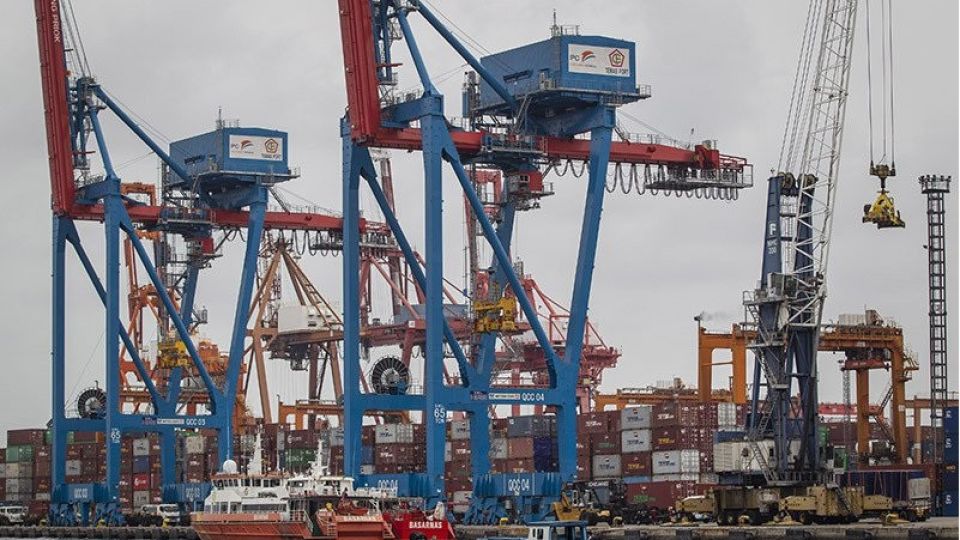August 31, 2022
JAKARTA – Indonesia’s membership in the Regional Comprehensive Economic Partnership (RCEP) will invigorate a wide range of sectors in the country, including food and transportation, a minister has said.
Coordinating Economic Affairs Minister Airlangga Hartarto said the trade deal would give Indonesian industries including fisheries, plantation and automotives better access to markets of RCEP members states like China, Japan and South Korea.
“The RCEP will open up greater opportunities for Indonesia, as it encourages expansion of regional production networks and regional value chains and provides a better business climate,” Airlangga said in a press briefing on Tuesday.
The RCEP is also set to remove barriers to trade in services and provide a comprehensive e-commerce ecosystem to boost member states’ digital economic growth, according to the minister.
Airlangga estimated that the trade deal could add 0.07 percentage points to Indonesia’s GDP by 2040, largely through a projected US$5 billion worth of additional exports and an unprecedented trade surplus.
The House of Representatives approved on Tuesday Indonesia’s membership to the RCEP, a multilateral agreement on the biggest trade block in the world.
The RCEP involves the ten ASEAN countries along with the east Asian economic powerhouses of China, Japan and South Korea and the Oceanian countries of Australia and New Zealand.
The 15 countries together account for almost a third of global-economic output, a quarter of worldwide trade and 31 percent of foreign direct investment (FDI) inflows. The RCEP eliminates up to 92 percent of tariffs on goods traded among its 15 members, but it extends beyond the typical scope of free-trade agreements by also standardizing many regulations on customs, investment, intellectual property and e-commerce.
The landmark agreement has been in effect since Jan. 1, after all prospective members ratified it last year, apart from Myanmar, the Philippines and Indonesia.
Separately, Airlangga said Indonesia had embarked on a diplomatic tour of the Asia Pacific region, including Japan, Australia and India, to promote its bid to establish the RCEP Secretariat in Jakarta, near the location of the current ASEAN Secretariat.
The country is currently vying with Cambodia for the role of hosting the office.
“There has been an agreement to support our bid, [referring to] my meeting with Singaporean counterparts,” he said when asked by the Post on Monday.
Anne Patricia Sutanto, head of the permanent committee for international treaties at the Indonesian Chamber of Commerce and Industry (Kadin), suggested that the government prepare adequate strategies to encourage businesses to take advantage of the RCEP.
“We believe [joining] the RCEP presents new opportunities for Indonesia. The RCEP can serve as a benchmark [guiding] Indonesia’s [businesses] as they compete on the domestic and [international] levels,” she told the Post on Tuesday.
She went on to say that Kadin did not see any significant lag caused by Indonesia’s relatively late ratification of the agreement but admitted that a more rigorous broadcast of the RCEP to stakeholders was necessary to get the most out of the deal.
Previously, the government set out to have the deal ratified by the House in January but failed to finalize the bill amid concern that the trade deal could trigger an influx of imported goods, leading officials to push back the deadline to the end of the first quarter.
After that deadline was missed, Jakarta also failed to make good on a government announcement to ratify the pact by mid-April.
Pulling down trade barriers
Fajar Hirawan, head of the economics department at the Centre for Strategic and International Studies (CSIS), said he expected Indonesia’s membership in the trade deal to minimize trade barriers among member states, thereby presenting the countries with an opportunity to increase their participation in global value chains.
He predicted it would take at least three years to fully assess the impact of the deal on the country’s economy considering the adjustments that needed to be made in the field.
“New rules need to be conveyed to all parties who deal with trading partner countries that are members of RCEP,” Fajar told the Post on Tuesday.
Dendi Ramdani, vice president of industry and regional research at state-owned Bank Mandiri, said the government had to facilitate efforts by industry players to break into the international market and attract investment. Meanwhile, domestic businesses would need to improve their capabilities to become more competitive at the international level.
“Both have to be implemented in tandem to reap maximum benefits from the trade deal,” he said, also on Tuesday.


